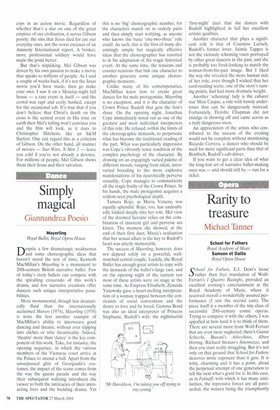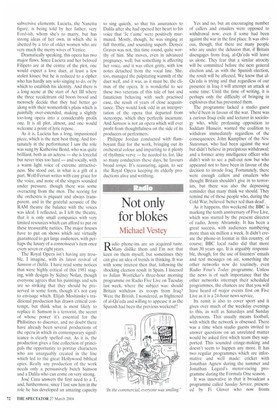Rarity to treasure
Michael Tanner
School for Fathers Royal Academy of Music Samson et Dallla Royal Opera House
School for Fathers, E.J. Dent's loose rather than free translation of WolfFerrari's I Quattro Rusteghi, provided an excellent evening's entertainment at the Royal Academy of Music, where it received overall a wonderfully assured performance (I saw the second cast). The piece itself is a member of the tiny class of successful 20th-century comic operas. Trying to compare it with the others, I was appalled at how hard it is to think of them. There are several more from Wolf-Ferrari that are even more neglected; there's Gianni Schicchi, Busoni's Arlecchino, Albert Herring, Richard Strauss's Intermezzo, and then you start really struggling. But it's not only on that ground that School for Fathers deserves more exposure than it gets. It is witty, charming and it has a point, about the perpetual attempt of one generation to tell the next what's good for it. In this case, as in Falstaff, with which it has many similarities, the repressive forces are all patriarchal, the women being the triumphantly
subversive elements. Lucieta, the Nanetta figure, is being told by her father, very Ford-ish, whom she's to marry, but has strong ideas of her own, in which she is abetted by a trio of older women who are very much the merry wives of Venice.
Dramatically speaking, this opera has two major flaws. Since Lucieta and her beloved Filipeto are at the centre of the plot, one would expect a love duet, at least a few stolen kisses; but he is reduced to a cipher who has hardly any solo singing to do, or by which to establish his identity. And there is a long scene at the start of Act III where the three recalcitrant old boors brood and morosely decide that they had better go along with their womenfolk's plans which is painfully over-extended, making a slightly too-long opera into a considerably prolix one. It is all plot, almost, and one would welcome a point of lyric repose.
As it is, Lucieta has a long, impassioned piece, which is the next best thing. And fortunately in the performance I saw the role was sung by Katherine Bond, who was quite brilliant, both as an actress — she is forceful but never tries too hard — and vocally, with a warm light voice of extreme attractiveness. She stood out, in what is a gift of a part. Wolf-Ferrari writes with easy grace for the voice, and none of the singers sounded under pressure, though there was some overacting from the men. The scoring for the orchestra is piquant and always transparent, and in the grateful acoustic of the RAM theatre the balance with the voices was ideal. I reflected, as I left the theatre. that it is only small companies with very limited resources which can afford to put on these treasurable rarities. The major houses have to put on shows which are virtually guaranteed to get large audiences, with perhaps the luxury of a connoisseur's item once every seven or eight years, The Royal Opera isn't having any trouble, I imagine, with its latest revival of Samson et Dalila. I have read some notices that were highly critical of this 1981 staging, with designs by Sidney Nolan, though everyone agrees that his paintings and sets are so striking that they should be preserved in some form, though it's not easy to envisage which. Elijah Moshinsky's traditional production has drawn critical contempt, but think what is most likely to replace it: Samson is a terrorist, the secret of whose power it's essential for the Philistines to discover, and no doubt there have already been several productions of the opera in which its contemporary significance is clearly spelled out. As it is, the production gives a fine collection of principals the opportunity to portray characters who are unarguably created in the line which led to the great Hollywood biblical epics. Really any production of the work needs only a persuasively butch Samson and a Dalila who can come on very strong.
Jose Cura answers the first need to a T, and, furthermore, since I last saw him in the role he has developed an amazing capacity to sing quietly, so that his assurances to Dalila after she had opened her heart to his voice that Je t'aime' were positively murmured. Mostly, though, he was singing at full throttle, and sounding superb. Denyce Graves was not, this time round, quite worthy of him. She moves, even in advanced pregnancy, well; but something is affecting her voice, and it was often gritty, with low notes detached from the vocal line. She, too, managed the palpitating warmth of the duet well, and it was, as it must be, the climax of the opera. It is wonderful to see these two veterans of this tale of lust and fanaticism behaving with such practised ease, the result of years of close acquaintance. They would look odd in an interpretation of the opera that departed from stereotype, which they perfectly incarnate. And Samson is not an opera which will ever profit from thoughtfulness on the side of its producers or performers.
Philippe Jordan conducted with flamboyant flair for the work, bringing out its orchestral colour and imparting to it plenty of rhythmic verve — he needed to, for, like so many conductors these days, he favours broad tempi. It's reassuring, again, to see the Royal Opera keeping its elderly productions alive and writhing.



























































































 Previous page
Previous page